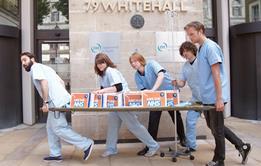38 Degrees provides an interesting challenge to the way in which the NHS engages with patients and the wider stakeholder group, but not without risks, caution Jonathan Hale and Karen Smith
While we do not endorse 38 Degrees – or any campaigning organisation – they can provide useful insight into public engagement.
‘By asking the right question, through the right channel, it is capturing something of the zeitgeist’
Its apparent success jars with the experience of many who work in consultation roles, who often find their efforts undermined by low response rates and inconclusive outcomes.
38 Degrees has the mechanisms in place to mobilise, at speed, a mass response to the questions of the day, within a short timeframe.

And, very simply, this seems to be the lesson – by asking the right question, through the right channel, it is capturing something of the zeitgeist.
A vast proportion of the population has constant access to email or social media and responding to a quick poll, while waiting for a train or at the school gates, is not an onerous task – particularly on a matter you care about.
- Read more from HSJ’s series of interviews about delivering lasting change within the NHS
- A new angle on public involvement
- The lessons the NHS can learn from 38 Degrees
Ensuring that patient and public views are understood and listened to is integral to changing the NHS. Developing a full and complete understanding as to what works, and what doesn’t, from a user perspective, will be fundamental to the success of new models of integrated care, refining emergency care arrangements and developing estates strategies.
Capturing opinion
Given this, we must think about how we capture opinion.
Better use of email and social media should feature within strategies, however it must be part of a mixed methodology.

In isolation, the 38 Degrees model presents a number of risks, two of particular note. First, it would not provide a representative, structured sample.
Second, it would be challenging to make sure that participants responding have all the information they need, in a way they can comprehend, to come to a fair view. In reality, some will need more help than others, to be able to contribute equitably.
And, in terms of asking the right question, the NHS cannot only ask the sexy questions that people like to talk about – it must also try and conjure interest in matters that might not appeal in an obvious way.
‘38 Degrees stimulates thinking. It testifies to the need to be in tune with what matters to the person on the street’
Despite these notes of caution, the example 38 Degrees stimulates thinking. It testifies to the need to be agile and in tune – to understand what matters to the person on the street and to better manage the bureaucracy that can make consultation too slow and untimely to add real value.
If patient centred care is to become the cultural norm, more effective ways of conversing must be found.
Jonathan Hale is a partner and Karen Smith is a senior consultant with GE Healthcare Finnamore. GE Healthcare Finnamore does not endorse 38 Degrees or necessarily agree with its views or those of its members
A new angle on public involvement

People power is at the heart of campaign group 38 Degrees
- 1
 Currently
reading
Currently
reading
The challenge for the NHS to better engage with patients
- 3































No comments yet